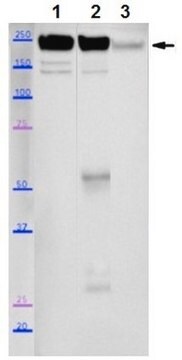ZRB2186
Anti-Myosin-10 Antibody, clone 1B3 ZooMAb® Rabbit Monoclonal

recombinant, expressed in HEK 293 cells
Synonim(y):
Myosin-10;Cellular myosin heavy chain type B;Myosin heavy chain 10;Myosin heavy chain non-muscle IIb; Non-muscle myosin heavy chain B;NMMHC-B:Non-muscle myosin heavy chain IIb:NMMHC II-b;NMMHC-IIB
About This Item
Polecane produkty
pochodzenie biologiczne
rabbit
Poziom jakości
rekombinowane
expressed in HEK 293 cells
białko sprzężone
unconjugated
forma przeciwciała
purified antibody
rodzaj przeciwciała
primary antibodies
klon
1B3, recombinant monoclonal
opis
1B3 Clone
linia produktu
ZooMAb® learn more
Postać
lyophilized
masa cząsteczkowa
calculated mol wt 229 kDa
observed mol wt ~230 kDa
oczyszczone przez
using Protein A
reaktywność gatunkowa
rat, mouse, monkey, human
opakowanie
antibody small pack of 25 μL
charakterystyka ekologicznej alternatywy
Waste Prevention
Designing Safer Chemicals
Design for Energy Efficiency
Learn more about the Principles of Green Chemistry.
rozszerzona walidacja
recombinant expression
Learn more about Antibody Enhanced Validation
sustainability
Greener Alternative Product
metody
affinity binding assay: suitable
immunohistochemistry: suitable
western blot: suitable
izotyp
IgG
sekwencja epitopowa
C-terminal
numer dostępu Protein ID
numer dostępu UniProt
kategoria ekologicznej alternatywy
, Aligned
Warunki transportu
ambient
temp. przechowywania
2-8°C
docelowa modyfikacja potranslacyjna
unmodified
informacje o genach
human ... MYH10(4628)
Opis ogólny
Specyficzność
Immunogen
Zastosowanie
Evaluated by Western Blotting in C6 cell lysate.
Western Blotting Analysis: A 1:1,000 dilution of this antibody detected Myosin-10 in C6 cell lysate.
Tested Applications
Western Blotting Analysis: A 1:1,000 dilution from a representative lot detected Myosin-10 in lysates from COS-7 and NIH3T3 cells and Human brain tissue and Mouse brain tissue.
Affinity Binding Assay: A representative lot of this antibody bound Myosin-10 peptide with a KD of 9.6 x 10-8 in an affinity binding assay.
Immunohistochemistry (Paraffin) Analysis: A 1:100 dilution from a representative lot detected Myosin-10 in human cerebellum tissue sections.
Note: Actual optimal working dilutions must be determined by end user as specimens, and experimental conditions may vary with the end user
Opis wartości docelowych
Postać fizyczna
Rekonstytucja
Przechowywanie i stabilność
Informacje prawne
Oświadczenie o zrzeczeniu się odpowiedzialności
Not finding the right product?
Try our Narzędzie selektora produktów.
Kod klasy składowania
11 - Combustible Solids
Klasa zagrożenia wodnego (WGK)
WGK 1
Temperatura zapłonu (°F)
Not applicable
Temperatura zapłonu (°C)
Not applicable
Certyfikaty analizy (CoA)
Poszukaj Certyfikaty analizy (CoA), wpisując numer partii/serii produktów. Numery serii i partii można znaleźć na etykiecie produktu po słowach „seria” lub „partia”.
Masz już ten produkt?
Dokumenty związane z niedawno zakupionymi produktami zostały zamieszczone w Bibliotece dokumentów.
Nasz zespół naukowców ma doświadczenie we wszystkich obszarach badań, w tym w naukach przyrodniczych, materiałoznawstwie, syntezie chemicznej, chromatografii, analityce i wielu innych dziedzinach.
Skontaktuj się z zespołem ds. pomocy technicznej







